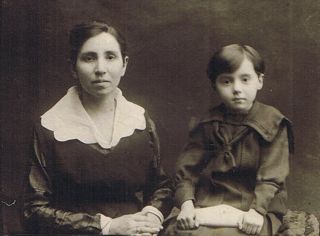 |
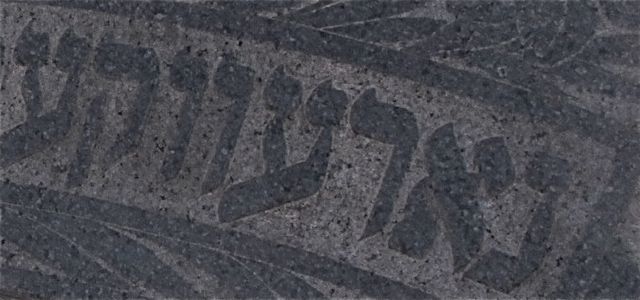 |
| Narewka
Home Page |
| Maps
& Gazetteers |
| Historical Texts &
Sources |
| Images: Past
& Present |
| Jewish Cemetery
(Kirkut) |
| Holocaust &
Memorials |
| Family
& Personal Stories |
| Family Pictures |
| Narevker
Landsmanshaftn |
| Websites &
Other Links |
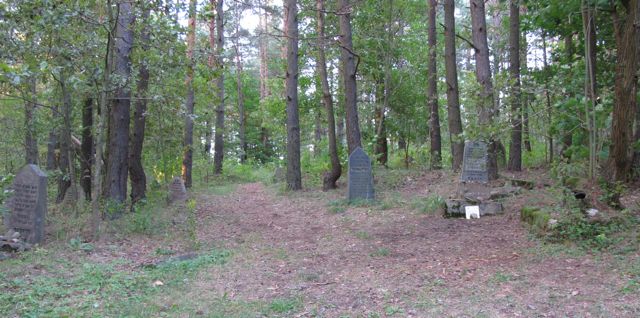 |
| Photos from Narewka August 2010 |
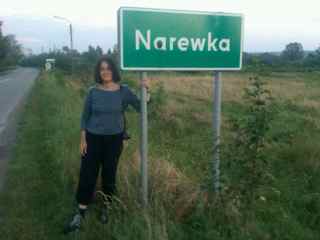 |
| Compiled
by Joy Kestenbaum Initially created December 2010 - Last updated June 2014 Copyright © 2010-2013 Joy Kestenbaum |
| JewishGen Home
Page |
| Index
to Separate Family Pages on the Narewka
KehilaLinks site: Altman Barton/Bartnowksy Birenbaum Caplan/Kaplanski Dolinski Grinberg/Levitzky/Rosenberg Jablanovich/Jabloniwicz Kagan Lash/Levitsky Levitsky Linevsky/Ain Irving Wallace and Liss Family Nachtigal Rubinstein - Rubinstein Shapiro |
Narewka
Family & Personal Stories
Altman:
100th Anniversary of the
TRIANGLE FACTORY FIRE: 25 March 1911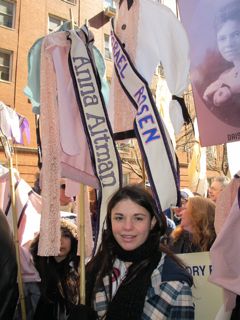 /25 March 2011: Thanks to
Lauren Shulsky Orenstein, I learned that Anna ALTMAN,
a victim of the Shirtwaist Triangle fire, and her
family
had immigrated to New York from Narewka, and that it
was Lauren's great-grandfather Morris ALTMAN, who
identified the body of his sixteen-year-old sister
Anna. Click here
for a separate page on Anna Altman. (For
more, see a copy
of
her
death
certificate and Remembering the
Triangle Factory Fire presented
by The
Kheel
Center, Catherwood Library in collabortion
with UNITE! - Cornell University ILR School; see
also
List of Victims and Death
List Show Few Identified from
New York Times, 26 March, 1911, p. 4; Memorial for
Anna
"Annie" Altman on Find-a-Grave
website.) (Photo of Anna Altman
banner being carried at the Centennial Procession of
146 Shirtwaists and Sashes to honor the victims and
at the Workers United - Official Triangle Fire 100th
Anniversary Commemoration; photo by Joy Kestenbaum,
25 March 2011)
/25 March 2011: Thanks to
Lauren Shulsky Orenstein, I learned that Anna ALTMAN,
a victim of the Shirtwaist Triangle fire, and her
family
had immigrated to New York from Narewka, and that it
was Lauren's great-grandfather Morris ALTMAN, who
identified the body of his sixteen-year-old sister
Anna. Click here
for a separate page on Anna Altman. (For
more, see a copy
of
her
death
certificate and Remembering the
Triangle Factory Fire presented
by The
Kheel
Center, Catherwood Library in collabortion
with UNITE! - Cornell University ILR School; see
also
List of Victims and Death
List Show Few Identified from
New York Times, 26 March, 1911, p. 4; Memorial for
Anna
"Annie" Altman on Find-a-Grave
website.) (Photo of Anna Altman
banner being carried at the Centennial Procession of
146 Shirtwaists and Sashes to honor the victims and
at the Workers United - Official Triangle Fire 100th
Anniversary Commemoration; photo by Joy Kestenbaum,
25 March 2011)
Barelkowski: The gravestone of Shlomo Moshe Barelkowski can be found in Narewka's Jewish Cemetery.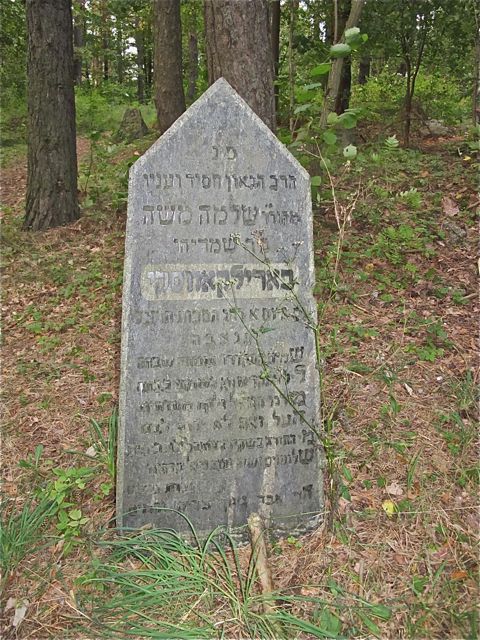 According to the translation
contributed by David Feldman, the inscription reads,
"Here lies the learned and humble rabbi; Shlomo Moshe
Barilkovski the son of Shmaryahu. Died the first day
of Sukkot - 15 of Tishrei 5694 - Oct. 5th, 1933.
He led our community for 36 years." This
text informs us that Shlomo Barelkowski had served as
a rabbi in Narewka for many years; additionally, it
provides evidence that, although he is listed on Yad
Vashem's Central Database of Shoah Victims' Names, he
died a few years before the beginning of World War II.
According to the
testimony
there, Rabbi Barilkowski was born in Jasionowka,
Poland, and was the son of Shmariahu and Khana. He
also appears on the Grodno Gubernia 1912 Voters List
(Narewka), the son of Shmerko. (photo by Joy
Kestenbaum, August 2010)
According to the translation
contributed by David Feldman, the inscription reads,
"Here lies the learned and humble rabbi; Shlomo Moshe
Barilkovski the son of Shmaryahu. Died the first day
of Sukkot - 15 of Tishrei 5694 - Oct. 5th, 1933.
He led our community for 36 years." This
text informs us that Shlomo Barelkowski had served as
a rabbi in Narewka for many years; additionally, it
provides evidence that, although he is listed on Yad
Vashem's Central Database of Shoah Victims' Names, he
died a few years before the beginning of World War II.
According to the
testimony
there, Rabbi Barilkowski was born in Jasionowka,
Poland, and was the son of Shmariahu and Khana. He
also appears on the Grodno Gubernia 1912 Voters List
(Narewka), the son of Shmerko. (photo by Joy
Kestenbaum, August 2010)
Barton/Bartnowsky: Narewka: to Complete the Circle (available on the Museum of Family History website and here), 10 mins. film by Tomasz Wisniewski about Nashville, Tennessee resident David Barton's 2009 visit to Narewka, where his ancestors had lived and from where his grandparents had emigrated with their six children, including his father, in the early 20th century. In 1906 David Barton's grandfather, Chaim Bartnowsky (Hyman Barton), a cobbler, went to Selma, Alabama, to work in the shoe store that he subsequently purchased; his family followed him there. Later, in 1923, David's father started Barton's Department Store.
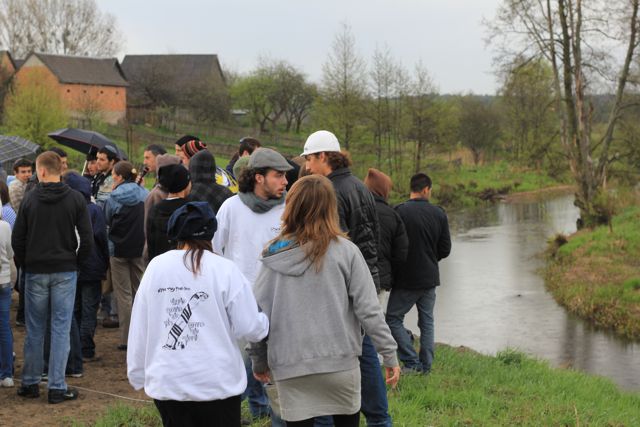 Birenbaum: Ten
years
ago
Israel
Birenbaum
visited
Narewka
with
his
father
Moshe,
who
was
born there in 1918 and left in June of 1941 to join
the Red Army, just days before the German invasion of
Russia. Israel just returned from a second trip made
with his brother Zvika in May of 2011, about two
months after his father's passing. They were
accompanied by 45 Israeli students from the high
school his brother runs; while in Narewka they had the
opportunity to meet with local Polish students. You
can read Israel's moving account of his two trips to
Narewka here, Visits
in
Narewka - Birenbaum Family.
The meeting between the Israeli and Polish students at
the School Complex (Zespole Szkół) in Narewka and
their joint tour of the town have also been reported
on the websites of the GOK
-
Gminny Osrodek Kultury (Narewka Municipal
Cultural Center) and the Zespół
Szkół. (photo courtesy of Israel
Birenbaum)
Birenbaum: Ten
years
ago
Israel
Birenbaum
visited
Narewka
with
his
father
Moshe,
who
was
born there in 1918 and left in June of 1941 to join
the Red Army, just days before the German invasion of
Russia. Israel just returned from a second trip made
with his brother Zvika in May of 2011, about two
months after his father's passing. They were
accompanied by 45 Israeli students from the high
school his brother runs; while in Narewka they had the
opportunity to meet with local Polish students. You
can read Israel's moving account of his two trips to
Narewka here, Visits
in
Narewka - Birenbaum Family.
The meeting between the Israeli and Polish students at
the School Complex (Zespole Szkół) in Narewka and
their joint tour of the town have also been reported
on the websites of the GOK
-
Gminny Osrodek Kultury (Narewka Municipal
Cultural Center) and the Zespół
Szkół. (photo courtesy of Israel
Birenbaum)
Caplan/Kaplański: David CAPLAN (Kaplański), son of Asher Bishka (Bischoff) HaCohen, was born in Narewka; he immigrated to New York c1889 and settled in Alexandria in Central Louisiana. After working as a peddler, he established his own dry goods store in Alexandria in 1891. Caplan's, specializing in men's clothing, is still a family-operated business, managed by one of David CAPLAN's grandsons. David Caplan married Katie Fineman in New York City in 1899. I have been able to determine that Yosef Kaplański, who remained in Narewka, where he died in 1936, was David Caplan's brother, as they both were sons of Asher Bishka HaCohen. Yosef's wife Rachel, his son Beni and daughter Luba were killed in the Shoah. His other daughters immigrated to Israel, New York and Mexico before World War II. Yosef's gravestone survives in the Narewka Cemetery.
Effron-Linevsky: In 1920, when she was six years old, Sylvia (Scheine) Dashefsky, nee Effron, left Narewka for New York with her mother Frume Effron (nee Linevsky) to meet her father, who had immigrated several years earlier. Her 1997 recorded interview, one of the Oral Histories of Ellis Island Immigrants, is accessible online for no charge on Ancestry.com. (Source Citation: Audio ID: EI-894, Ellis Island Oral History Program, Oral History Project, Ellis Island Immigration Museum, New York City, New York.) For Batya Dashefsky's tribute to her parents, see "The Memories of Leo and Sylvia Dashefsky," (an exhibition on the Museum of Family History website). (Passport Photo of Fruma and Sylvia Effron, courtesy of Batya Dashefsky)
Jablanovich/Jablonowicz: The Jablanovich family is one of the few families from Narewka found in the 1897 Russian Census. Leizar Abramov Yablonvich and his son Srol (Israel) are described on the census as shoemakers. Wolf Jablanovich/Jablonowicz (Zeev Tapoohi in Hebrew), the son of Srol and Sora-Leya, was the youngest of nine children. He made aliyah in 1934 at the age of 19 and never saw his family in Narewka again, because of the Shoah. For photographs contributed by Rivka Witenberg, daughter of Wolf/Zeev, and more on the family, see Narewka and the Jablanovich/Jablonowicz Family.
Katz: Centropa Interview with Emilia (Endler) Ratz, Holocaust survivor, who was born in Warsaw and whose maternal grandparents (surname KATZ) lived in Narewka, where her mother, Marija nee Katz, was born in 1896. (Country: Austria; Interviewer: Tanja Eckstein; Date of Interview: July 2004) (Centropa - Central Europe Center for Research and Documentation)
Levitsky: Martin Jacobs contributed some family photographs and pages from his great-aunt Esther's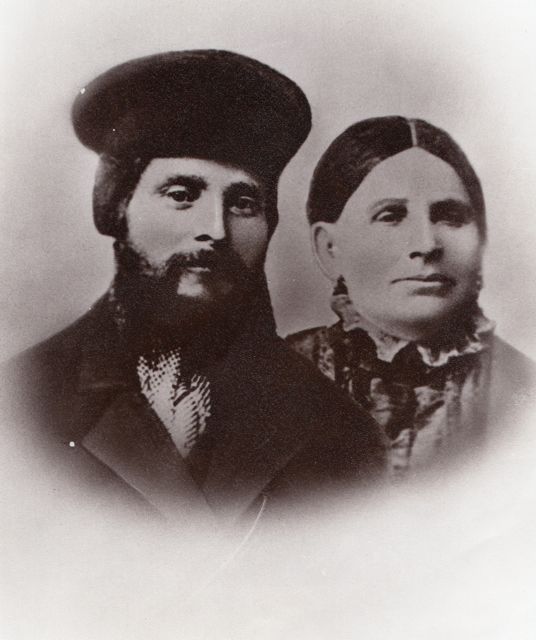 self-published memoir, My Life Story.
Born in Narewka, she left for Bialystok as a child
with her family, before she emigrated to London in
1901. Her parents, Yossel and Sarah (Waran)
Levitsky, made aliyah to Palestine before World
War I. Esther later moved to Australia. In her memoir,
printed in 1962, she wrote of their early years, "It
was a hard life, as twelve of us children had to be
fed, and our dear parents, also. And now some of us
are in the far corners of the world - Great Russia,
England, America, Israel and Australia - and their
children, grandchildren, and great-grand children." As
it turns out, Martin Jacob's grandfather Nathan
(Nachman) was friendly with some of my English family
members, as two of my grandfather's sisters settled in
London. (photo courtesy of Martin Jacobs)
self-published memoir, My Life Story.
Born in Narewka, she left for Bialystok as a child
with her family, before she emigrated to London in
1901. Her parents, Yossel and Sarah (Waran)
Levitsky, made aliyah to Palestine before World
War I. Esther later moved to Australia. In her memoir,
printed in 1962, she wrote of their early years, "It
was a hard life, as twelve of us children had to be
fed, and our dear parents, also. And now some of us
are in the far corners of the world - Great Russia,
England, America, Israel and Australia - and their
children, grandchildren, and great-grand children." As
it turns out, Martin Jacob's grandfather Nathan
(Nachman) was friendly with some of my English family
members, as two of my grandfather's sisters settled in
London. (photo courtesy of Martin Jacobs)
Leyson/Leizon:
Members of the Leyson/Leizon family share their
memories of Narewka and experiences during World War
II:
Family & Personal Stories
 /25 March 2011: Thanks to
Lauren Shulsky Orenstein, I learned that Anna ALTMAN,
a victim of the Shirtwaist Triangle fire, and her
family
had immigrated to New York from Narewka, and that it
was Lauren's great-grandfather Morris ALTMAN, who
identified the body of his sixteen-year-old sister
Anna. Click here
for a separate page on Anna Altman. (For
more, see a copy
of
her
death
certificate and Remembering the
Triangle Factory Fire presented
by The
Kheel
Center, Catherwood Library in collabortion
with UNITE! - Cornell University ILR School; see
also
List of Victims and Death
List Show Few Identified from
New York Times, 26 March, 1911, p. 4; Memorial for
Anna
"Annie" Altman on Find-a-Grave
website.) (Photo of Anna Altman
banner being carried at the Centennial Procession of
146 Shirtwaists and Sashes to honor the victims and
at the Workers United - Official Triangle Fire 100th
Anniversary Commemoration; photo by Joy Kestenbaum,
25 March 2011)
/25 March 2011: Thanks to
Lauren Shulsky Orenstein, I learned that Anna ALTMAN,
a victim of the Shirtwaist Triangle fire, and her
family
had immigrated to New York from Narewka, and that it
was Lauren's great-grandfather Morris ALTMAN, who
identified the body of his sixteen-year-old sister
Anna. Click here
for a separate page on Anna Altman. (For
more, see a copy
of
her
death
certificate and Remembering the
Triangle Factory Fire presented
by The
Kheel
Center, Catherwood Library in collabortion
with UNITE! - Cornell University ILR School; see
also
List of Victims and Death
List Show Few Identified from
New York Times, 26 March, 1911, p. 4; Memorial for
Anna
"Annie" Altman on Find-a-Grave
website.) (Photo of Anna Altman
banner being carried at the Centennial Procession of
146 Shirtwaists and Sashes to honor the victims and
at the Workers United - Official Triangle Fire 100th
Anniversary Commemoration; photo by Joy Kestenbaum,
25 March 2011)Barelkowski: The gravestone of Shlomo Moshe Barelkowski can be found in Narewka's Jewish Cemetery.
 According to the translation
contributed by David Feldman, the inscription reads,
"Here lies the learned and humble rabbi; Shlomo Moshe
Barilkovski the son of Shmaryahu. Died the first day
of Sukkot - 15 of Tishrei 5694 - Oct. 5th, 1933.
He led our community for 36 years." This
text informs us that Shlomo Barelkowski had served as
a rabbi in Narewka for many years; additionally, it
provides evidence that, although he is listed on Yad
Vashem's Central Database of Shoah Victims' Names, he
died a few years before the beginning of World War II.
According to the
testimony
there, Rabbi Barilkowski was born in Jasionowka,
Poland, and was the son of Shmariahu and Khana. He
also appears on the Grodno Gubernia 1912 Voters List
(Narewka), the son of Shmerko. (photo by Joy
Kestenbaum, August 2010)
According to the translation
contributed by David Feldman, the inscription reads,
"Here lies the learned and humble rabbi; Shlomo Moshe
Barilkovski the son of Shmaryahu. Died the first day
of Sukkot - 15 of Tishrei 5694 - Oct. 5th, 1933.
He led our community for 36 years." This
text informs us that Shlomo Barelkowski had served as
a rabbi in Narewka for many years; additionally, it
provides evidence that, although he is listed on Yad
Vashem's Central Database of Shoah Victims' Names, he
died a few years before the beginning of World War II.
According to the
testimony
there, Rabbi Barilkowski was born in Jasionowka,
Poland, and was the son of Shmariahu and Khana. He
also appears on the Grodno Gubernia 1912 Voters List
(Narewka), the son of Shmerko. (photo by Joy
Kestenbaum, August 2010)Barton/Bartnowsky: Narewka: to Complete the Circle (available on the Museum of Family History website and here), 10 mins. film by Tomasz Wisniewski about Nashville, Tennessee resident David Barton's 2009 visit to Narewka, where his ancestors had lived and from where his grandparents had emigrated with their six children, including his father, in the early 20th century. In 1906 David Barton's grandfather, Chaim Bartnowsky (Hyman Barton), a cobbler, went to Selma, Alabama, to work in the shoe store that he subsequently purchased; his family followed him there. Later, in 1923, David's father started Barton's Department Store.
 Birenbaum: Ten
years
ago
Israel
Birenbaum
visited
Narewka
with
his
father
Moshe,
who
was
born there in 1918 and left in June of 1941 to join
the Red Army, just days before the German invasion of
Russia. Israel just returned from a second trip made
with his brother Zvika in May of 2011, about two
months after his father's passing. They were
accompanied by 45 Israeli students from the high
school his brother runs; while in Narewka they had the
opportunity to meet with local Polish students. You
can read Israel's moving account of his two trips to
Narewka here, Visits
in
Narewka - Birenbaum Family.
The meeting between the Israeli and Polish students at
the School Complex (Zespole Szkół) in Narewka and
their joint tour of the town have also been reported
on the websites of the GOK
-
Gminny Osrodek Kultury (Narewka Municipal
Cultural Center) and the Zespół
Szkół. (photo courtesy of Israel
Birenbaum)
Birenbaum: Ten
years
ago
Israel
Birenbaum
visited
Narewka
with
his
father
Moshe,
who
was
born there in 1918 and left in June of 1941 to join
the Red Army, just days before the German invasion of
Russia. Israel just returned from a second trip made
with his brother Zvika in May of 2011, about two
months after his father's passing. They were
accompanied by 45 Israeli students from the high
school his brother runs; while in Narewka they had the
opportunity to meet with local Polish students. You
can read Israel's moving account of his two trips to
Narewka here, Visits
in
Narewka - Birenbaum Family.
The meeting between the Israeli and Polish students at
the School Complex (Zespole Szkół) in Narewka and
their joint tour of the town have also been reported
on the websites of the GOK
-
Gminny Osrodek Kultury (Narewka Municipal
Cultural Center) and the Zespół
Szkół. (photo courtesy of Israel
Birenbaum)Caplan/Kaplański: David CAPLAN (Kaplański), son of Asher Bishka (Bischoff) HaCohen, was born in Narewka; he immigrated to New York c1889 and settled in Alexandria in Central Louisiana. After working as a peddler, he established his own dry goods store in Alexandria in 1891. Caplan's, specializing in men's clothing, is still a family-operated business, managed by one of David CAPLAN's grandsons. David Caplan married Katie Fineman in New York City in 1899. I have been able to determine that Yosef Kaplański, who remained in Narewka, where he died in 1936, was David Caplan's brother, as they both were sons of Asher Bishka HaCohen. Yosef's wife Rachel, his son Beni and daughter Luba were killed in the Shoah. His other daughters immigrated to Israel, New York and Mexico before World War II. Yosef's gravestone survives in the Narewka Cemetery.
Effron-Linevsky: In 1920, when she was six years old, Sylvia (Scheine) Dashefsky, nee Effron, left Narewka for New York with her mother Frume Effron (nee Linevsky) to meet her father, who had immigrated several years earlier. Her 1997 recorded interview, one of the Oral Histories of Ellis Island Immigrants, is accessible online for no charge on Ancestry.com. (Source Citation: Audio ID: EI-894, Ellis Island Oral History Program, Oral History Project, Ellis Island Immigration Museum, New York City, New York.) For Batya Dashefsky's tribute to her parents, see "The Memories of Leo and Sylvia Dashefsky," (an exhibition on the Museum of Family History website). (Passport Photo of Fruma and Sylvia Effron, courtesy of Batya Dashefsky)
Grajewski:
Ajzyk (Isaac) Grajewski (c1895-1941) was the last
rabbi of the Narewka Jewish community. He may
have been 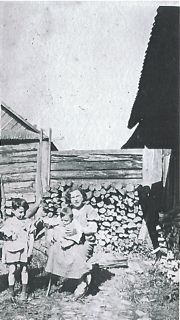 appointed after the
death of Shlomo Moshe Barelkowski in 1933. (See
Barelkowski, above.) Rabbi Grajewski and his family
(his wife Rywka and young children, Pinchas, Feigele,
Liebenke) were all killed in the Shoah. Grajewski was
probably originally from Bialystok. According to the
brief reference in one volume of the Hebrew
multi-volume work, Atlas
Etz-Hayim, Atlas of the Tree of Life (1987,
Tel Aviv), by Raphael Halperin, Grajewski was a
prominent Polish rabbi who led a Novaredoker Bes Jozef Yeshiva
and became the head of the rabbinical court (beth din) of
Narewka. If anyone has additional information
about Rabbi Grajewski or his family, please contact me. (photo
of Grajewski's wife Rywka with two of her children,
courtesy of Barbara Kotin; see Family
Pictures; see also 1935
certificate signed by A. Grajewski, Rabin
Gminy Wyzyznaniowej Żydowskiej, Rabbi of Jewish
Religious Community, Narewka, courtesy of Phillip
Schreibman.)
appointed after the
death of Shlomo Moshe Barelkowski in 1933. (See
Barelkowski, above.) Rabbi Grajewski and his family
(his wife Rywka and young children, Pinchas, Feigele,
Liebenke) were all killed in the Shoah. Grajewski was
probably originally from Bialystok. According to the
brief reference in one volume of the Hebrew
multi-volume work, Atlas
Etz-Hayim, Atlas of the Tree of Life (1987,
Tel Aviv), by Raphael Halperin, Grajewski was a
prominent Polish rabbi who led a Novaredoker Bes Jozef Yeshiva
and became the head of the rabbinical court (beth din) of
Narewka. If anyone has additional information
about Rabbi Grajewski or his family, please contact me. (photo
of Grajewski's wife Rywka with two of her children,
courtesy of Barbara Kotin; see Family
Pictures; see also 1935
certificate signed by A. Grajewski, Rabin
Gminy Wyzyznaniowej Żydowskiej, Rabbi of Jewish
Religious Community, Narewka, courtesy of Phillip
Schreibman.)
 appointed after the
death of Shlomo Moshe Barelkowski in 1933. (See
Barelkowski, above.) Rabbi Grajewski and his family
(his wife Rywka and young children, Pinchas, Feigele,
Liebenke) were all killed in the Shoah. Grajewski was
probably originally from Bialystok. According to the
brief reference in one volume of the Hebrew
multi-volume work, Atlas
Etz-Hayim, Atlas of the Tree of Life (1987,
Tel Aviv), by Raphael Halperin, Grajewski was a
prominent Polish rabbi who led a Novaredoker Bes Jozef Yeshiva
and became the head of the rabbinical court (beth din) of
Narewka. If anyone has additional information
about Rabbi Grajewski or his family, please contact me. (photo
of Grajewski's wife Rywka with two of her children,
courtesy of Barbara Kotin; see Family
Pictures; see also 1935
certificate signed by A. Grajewski, Rabin
Gminy Wyzyznaniowej Żydowskiej, Rabbi of Jewish
Religious Community, Narewka, courtesy of Phillip
Schreibman.)
appointed after the
death of Shlomo Moshe Barelkowski in 1933. (See
Barelkowski, above.) Rabbi Grajewski and his family
(his wife Rywka and young children, Pinchas, Feigele,
Liebenke) were all killed in the Shoah. Grajewski was
probably originally from Bialystok. According to the
brief reference in one volume of the Hebrew
multi-volume work, Atlas
Etz-Hayim, Atlas of the Tree of Life (1987,
Tel Aviv), by Raphael Halperin, Grajewski was a
prominent Polish rabbi who led a Novaredoker Bes Jozef Yeshiva
and became the head of the rabbinical court (beth din) of
Narewka. If anyone has additional information
about Rabbi Grajewski or his family, please contact me. (photo
of Grajewski's wife Rywka with two of her children,
courtesy of Barbara Kotin; see Family
Pictures; see also 1935
certificate signed by A. Grajewski, Rabin
Gminy Wyzyznaniowej Żydowskiej, Rabbi of Jewish
Religious Community, Narewka, courtesy of Phillip
Schreibman.)Grinberg: Not
a
great
deal
is
known
about
the
history of the spiritual leaders of the Narewka
Jewish community.
(See also listings, above, for Barelkowski and
Grajewski.) Feivel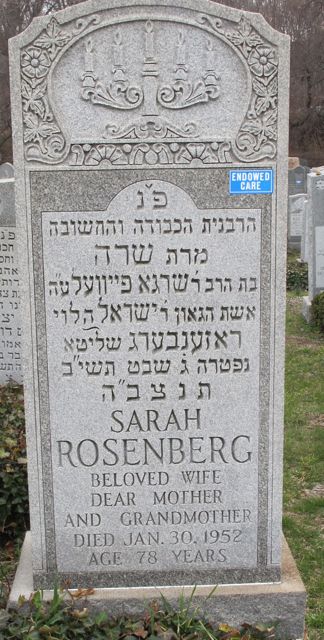 (Fejwel)
Grinberg, who is said to have served as a
rabbi in 1900, was also a local merchant. One
daughter, Sarah,
married Israel
Rosenberg, who studied at the yeshivas in
Slobodka and Novaredok. In 1902 Israel Rosenberg
left Narewka for New York; his wife and daughters
joined him the following year. Rabbi Rosenberg
became the president of the Agudas HaRabonim, the
Union of Orthodox Rabbis of the United States and
Canada. Rachel
Levitzky, the wife of Morris Levitzky,
secretary of the Narevker Aid Society in New York,
may also have been a daughter of Feivel Grinberg. (photo
of Sarah Rosenberg's gravestone, courtesy of Joy
Kestenbaum)
(Fejwel)
Grinberg, who is said to have served as a
rabbi in 1900, was also a local merchant. One
daughter, Sarah,
married Israel
Rosenberg, who studied at the yeshivas in
Slobodka and Novaredok. In 1902 Israel Rosenberg
left Narewka for New York; his wife and daughters
joined him the following year. Rabbi Rosenberg
became the president of the Agudas HaRabonim, the
Union of Orthodox Rabbis of the United States and
Canada. Rachel
Levitzky, the wife of Morris Levitzky,
secretary of the Narevker Aid Society in New York,
may also have been a daughter of Feivel Grinberg. (photo
of Sarah Rosenberg's gravestone, courtesy of Joy
Kestenbaum)
 (Fejwel)
Grinberg, who is said to have served as a
rabbi in 1900, was also a local merchant. One
daughter, Sarah,
married Israel
Rosenberg, who studied at the yeshivas in
Slobodka and Novaredok. In 1902 Israel Rosenberg
left Narewka for New York; his wife and daughters
joined him the following year. Rabbi Rosenberg
became the president of the Agudas HaRabonim, the
Union of Orthodox Rabbis of the United States and
Canada. Rachel
Levitzky, the wife of Morris Levitzky,
secretary of the Narevker Aid Society in New York,
may also have been a daughter of Feivel Grinberg. (photo
of Sarah Rosenberg's gravestone, courtesy of Joy
Kestenbaum)
(Fejwel)
Grinberg, who is said to have served as a
rabbi in 1900, was also a local merchant. One
daughter, Sarah,
married Israel
Rosenberg, who studied at the yeshivas in
Slobodka and Novaredok. In 1902 Israel Rosenberg
left Narewka for New York; his wife and daughters
joined him the following year. Rabbi Rosenberg
became the president of the Agudas HaRabonim, the
Union of Orthodox Rabbis of the United States and
Canada. Rachel
Levitzky, the wife of Morris Levitzky,
secretary of the Narevker Aid Society in New York,
may also have been a daughter of Feivel Grinberg. (photo
of Sarah Rosenberg's gravestone, courtesy of Joy
Kestenbaum)Jablanovich/Jablonowicz: The Jablanovich family is one of the few families from Narewka found in the 1897 Russian Census. Leizar Abramov Yablonvich and his son Srol (Israel) are described on the census as shoemakers. Wolf Jablanovich/Jablonowicz (Zeev Tapoohi in Hebrew), the son of Srol and Sora-Leya, was the youngest of nine children. He made aliyah in 1934 at the age of 19 and never saw his family in Narewka again, because of the Shoah. For photographs contributed by Rivka Witenberg, daughter of Wolf/Zeev, and more on the family, see Narewka and the Jablanovich/Jablonowicz Family.
Katz: Centropa Interview with Emilia (Endler) Ratz, Holocaust survivor, who was born in Warsaw and whose maternal grandparents (surname KATZ) lived in Narewka, where her mother, Marija nee Katz, was born in 1896. (Country: Austria; Interviewer: Tanja Eckstein; Date of Interview: July 2004) (Centropa - Central Europe Center for Research and Documentation)
Levitsky: Martin Jacobs contributed some family photographs and pages from his great-aunt Esther's
 self-published memoir, My Life Story.
Born in Narewka, she left for Bialystok as a child
with her family, before she emigrated to London in
1901. Her parents, Yossel and Sarah (Waran)
Levitsky, made aliyah to Palestine before World
War I. Esther later moved to Australia. In her memoir,
printed in 1962, she wrote of their early years, "It
was a hard life, as twelve of us children had to be
fed, and our dear parents, also. And now some of us
are in the far corners of the world - Great Russia,
England, America, Israel and Australia - and their
children, grandchildren, and great-grand children." As
it turns out, Martin Jacob's grandfather Nathan
(Nachman) was friendly with some of my English family
members, as two of my grandfather's sisters settled in
London. (photo courtesy of Martin Jacobs)
self-published memoir, My Life Story.
Born in Narewka, she left for Bialystok as a child
with her family, before she emigrated to London in
1901. Her parents, Yossel and Sarah (Waran)
Levitsky, made aliyah to Palestine before World
War I. Esther later moved to Australia. In her memoir,
printed in 1962, she wrote of their early years, "It
was a hard life, as twelve of us children had to be
fed, and our dear parents, also. And now some of us
are in the far corners of the world - Great Russia,
England, America, Israel and Australia - and their
children, grandchildren, and great-grand children." As
it turns out, Martin Jacob's grandfather Nathan
(Nachman) was friendly with some of my English family
members, as two of my grandfather's sisters settled in
London. (photo courtesy of Martin Jacobs)- Narewka: Accounts, memories: Interviews: Aviva Nisenbaum (nee Leizon) (On the Virtual Shtetl website)
- Narewka: Accounts, memories: Interviews: David Leizon (On the Virtual Shtetl website)
- Little Leyson, The Schindler Story
- New: Leyon
Leyson's 1995 Shoah Foundation testimony,
about his early life in Narewka, his family,
his experiences during the Holocaust and how
he was saved by Oskar Schindler.
Go to the USC Shoah Foundation Visual History Archive Online. You need to register online and then
search by the Leyson name or interview code 8916. - We
Remember and Pay Tribute: Fullerton's Leon
Leyson - Youngest Schindler Jew,
interviewed by his daughter-in-law on Southern
California Public Radio, 28 May 2011
- Leon Leyson Remembers: Holocaust Survivor Leon Leyson Tells His Story: Lecture at the Asper School of Business, University of Manitoba, 4 March 2010; (On the Asper Media Centre website) Leon Leyson, a native of Narewka, moved to Krakow with his family when he was nine years old.
Linevsky: See
Effron-Linevsky, above.
Liss:
According
to Irving
Wallace: A Writer's Profile, IRVING
WALLACE (1916-1990), American 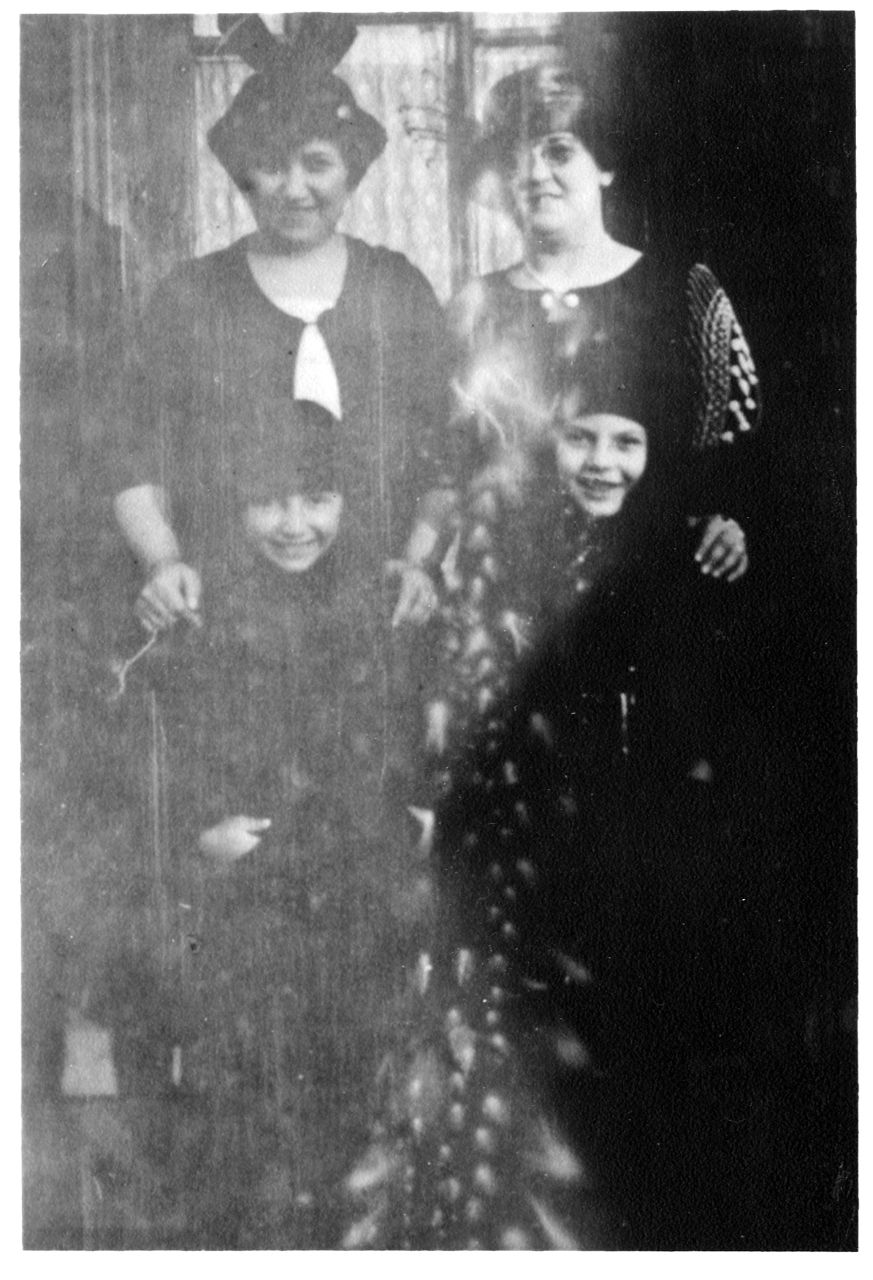 best-selling author
and screenwriter, born in Chicago, Illinois, and
raised in Kenosha, Wisconsin, was named after his
maternal grandfather, a bookkeeper and Talmudic
scholar in Narewka (p. 10). Bessie LISS, Wallace's
mother, and aunts and uncles emigrated to the United
States. Narewka provided the connection by which
Wallace's parents would first meet. In Chicago
Bessie LISS met
her future husband Alex Wallace
(Wallechinsky) at the wedding of one of his
step-sisters, who was marrying a man from Narewka
(p.13).
For more on the LISS famiily,
see the webpage on this Narewka website, Irving Wallace and
the LISS Family. (Photo used with
permission, University of Wisconsin - Parkside
Archives.)
best-selling author
and screenwriter, born in Chicago, Illinois, and
raised in Kenosha, Wisconsin, was named after his
maternal grandfather, a bookkeeper and Talmudic
scholar in Narewka (p. 10). Bessie LISS, Wallace's
mother, and aunts and uncles emigrated to the United
States. Narewka provided the connection by which
Wallace's parents would first meet. In Chicago
Bessie LISS met
her future husband Alex Wallace
(Wallechinsky) at the wedding of one of his
step-sisters, who was marrying a man from Narewka
(p.13).
For more on the LISS famiily,
see the webpage on this Narewka website, Irving Wallace and
the LISS Family. (Photo used with
permission, University of Wisconsin - Parkside
Archives.)
Shapiro: Moshe and Bella Shapiro had a grain store in Narewka. Seven of their children immigrated to New York, beginning with a daughter, Fannie, who left in 1902 at the age of seventeen. Fannie and several of her siblings returned to Narewka in the 1920s and 1930s to visit the family. Barry Traub has published a monograph, Our Family History, with accounts of family visits to Narewka, including the one he took with two of his daughters in the summer of 2004. Excerpts from the book can be read here.
Shendrovski/Wasilkowski: Netta Kaplan visited Narewka in August of 2013 with her brother Tal, sister Avivi and mother Asnat. Her grandparents, Pua Wasilkowski and Zvi Shenderovski, met in Narewka; they immigrated to Palestine in 1925. Born in Slonim, Zvi had arrived in Narewka with his family in 1907, when he was six. His father Bezalel served as a cantor and shochet. Her grandfather's entire family went to Palestine before World War II. Pua's sister Esther immigrated to New York in 1934, after marrying Solomon (Shlomo), the son of Moshe and Bella Shapiro of Narewka (see Shapiro, just above). Pua and Esther were the only ones in the Wasilkowski family who survived the Shoah.
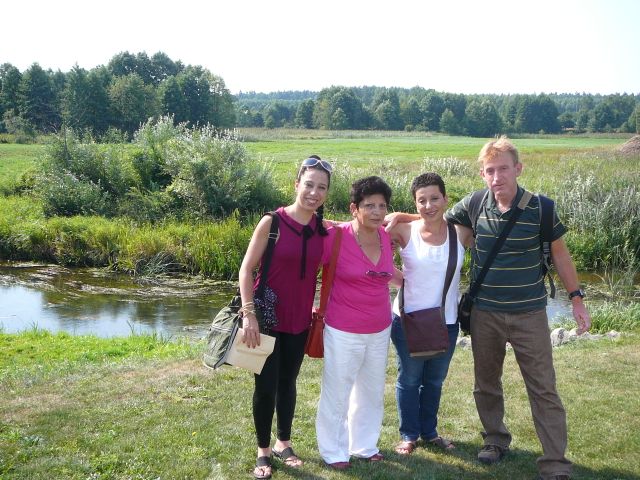
 best-selling author
and screenwriter, born in Chicago, Illinois, and
raised in Kenosha, Wisconsin, was named after his
maternal grandfather, a bookkeeper and Talmudic
scholar in Narewka (p. 10). Bessie LISS, Wallace's
mother, and aunts and uncles emigrated to the United
States. Narewka provided the connection by which
Wallace's parents would first meet. In Chicago
Bessie LISS met
her future husband Alex Wallace
(Wallechinsky) at the wedding of one of his
step-sisters, who was marrying a man from Narewka
(p.13).
For more on the LISS famiily,
see the webpage on this Narewka website, Irving Wallace and
the LISS Family. (Photo used with
permission, University of Wisconsin - Parkside
Archives.)
best-selling author
and screenwriter, born in Chicago, Illinois, and
raised in Kenosha, Wisconsin, was named after his
maternal grandfather, a bookkeeper and Talmudic
scholar in Narewka (p. 10). Bessie LISS, Wallace's
mother, and aunts and uncles emigrated to the United
States. Narewka provided the connection by which
Wallace's parents would first meet. In Chicago
Bessie LISS met
her future husband Alex Wallace
(Wallechinsky) at the wedding of one of his
step-sisters, who was marrying a man from Narewka
(p.13).
For more on the LISS famiily,
see the webpage on this Narewka website, Irving Wallace and
the LISS Family. (Photo used with
permission, University of Wisconsin - Parkside
Archives.)Shapiro: Moshe and Bella Shapiro had a grain store in Narewka. Seven of their children immigrated to New York, beginning with a daughter, Fannie, who left in 1902 at the age of seventeen. Fannie and several of her siblings returned to Narewka in the 1920s and 1930s to visit the family. Barry Traub has published a monograph, Our Family History, with accounts of family visits to Narewka, including the one he took with two of his daughters in the summer of 2004. Excerpts from the book can be read here.
Shendrovski/Wasilkowski: Netta Kaplan visited Narewka in August of 2013 with her brother Tal, sister Avivi and mother Asnat. Her grandparents, Pua Wasilkowski and Zvi Shenderovski, met in Narewka; they immigrated to Palestine in 1925. Born in Slonim, Zvi had arrived in Narewka with his family in 1907, when he was six. His father Bezalel served as a cantor and shochet. Her grandfather's entire family went to Palestine before World War II. Pua's sister Esther immigrated to New York in 1934, after marrying Solomon (Shlomo), the son of Moshe and Bella Shapiro of Narewka (see Shapiro, just above). Pua and Esther were the only ones in the Wasilkowski family who survived the Shoah.

